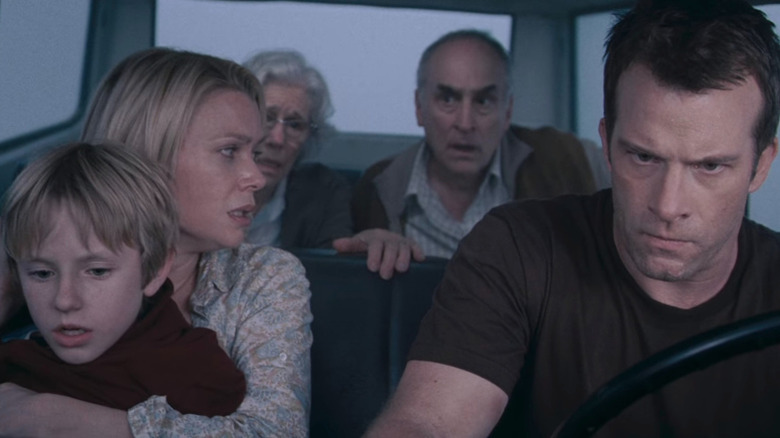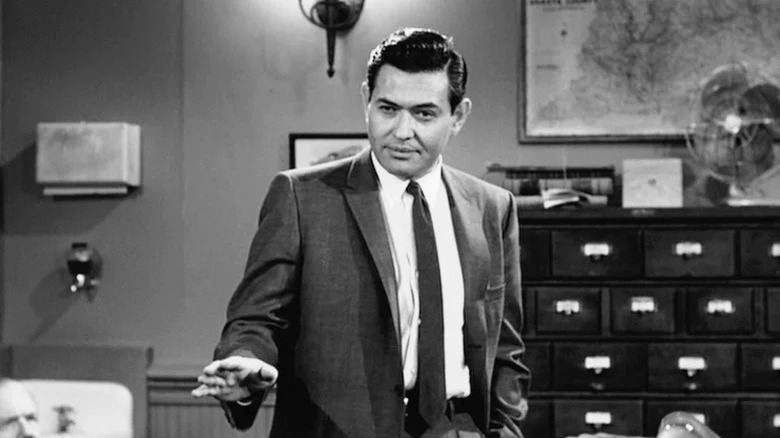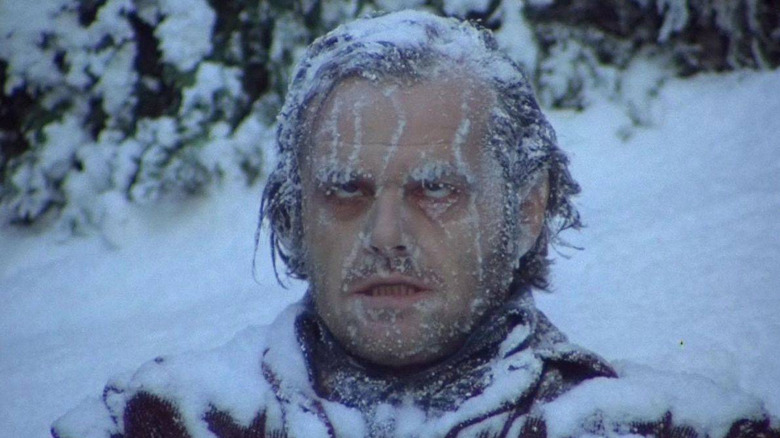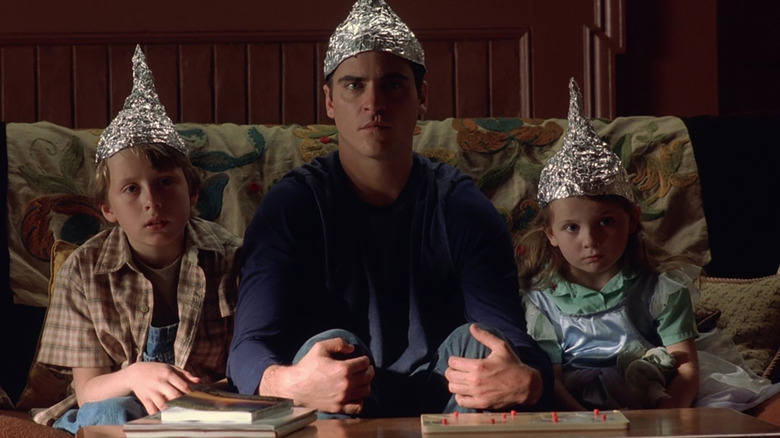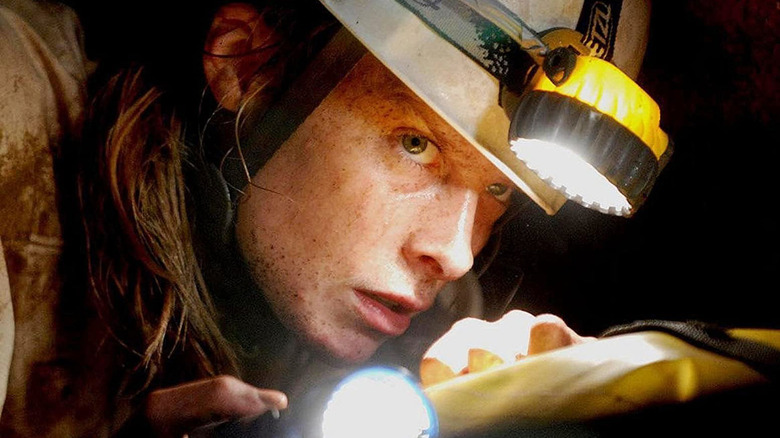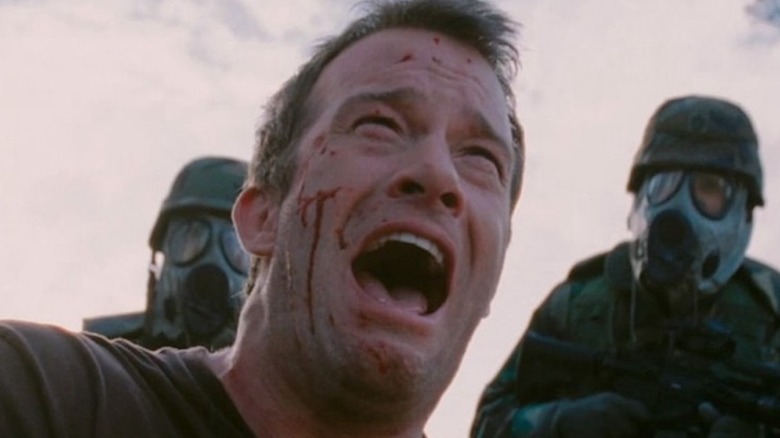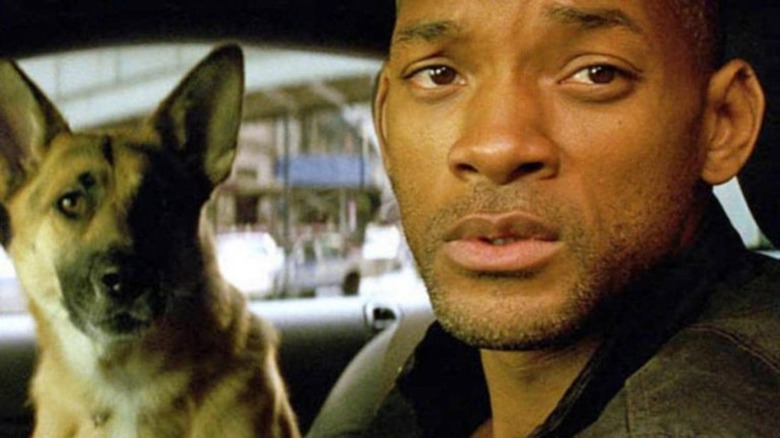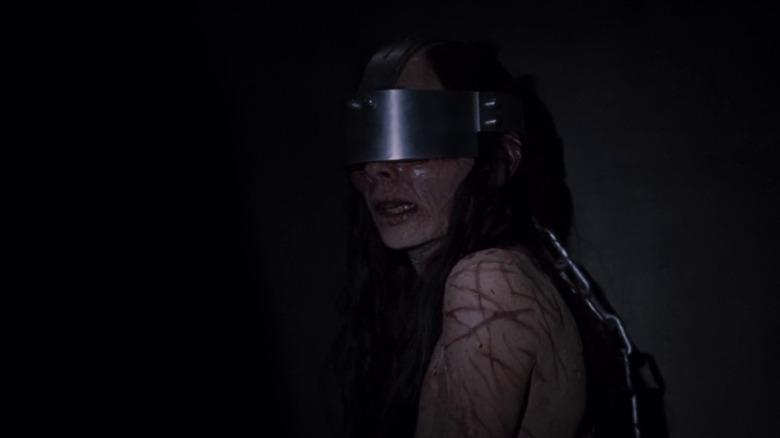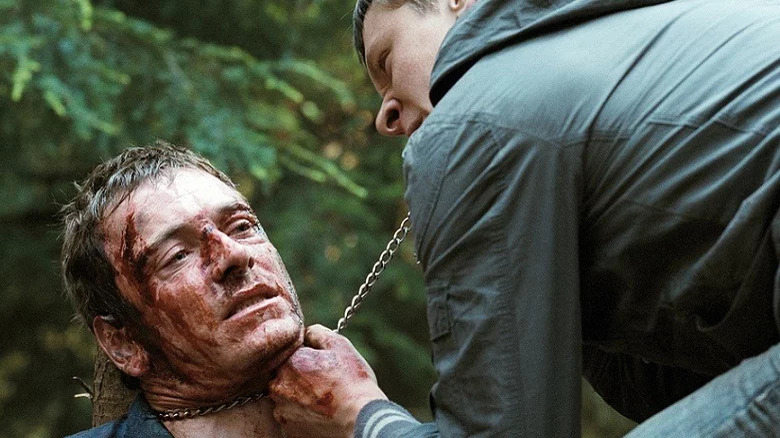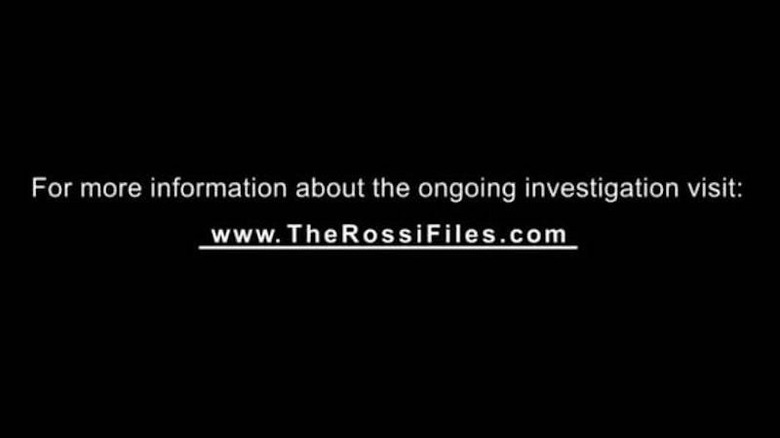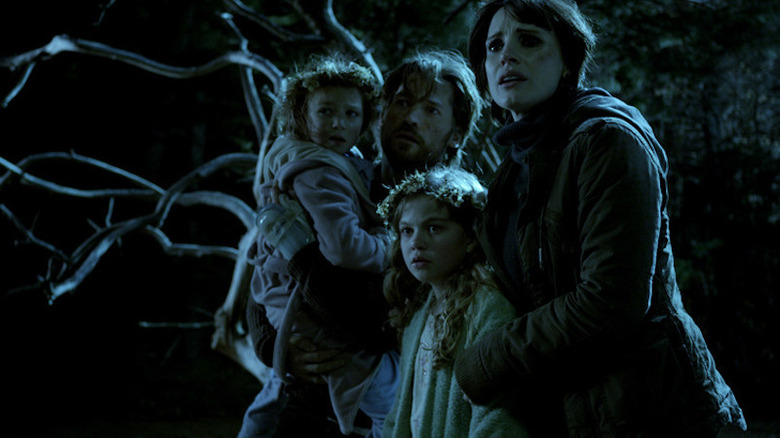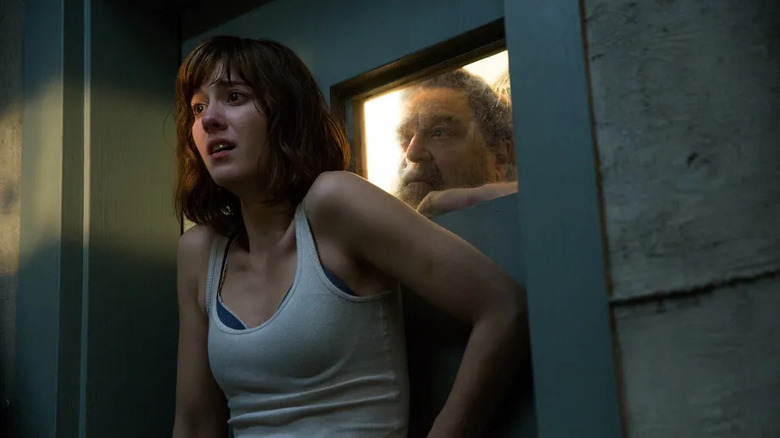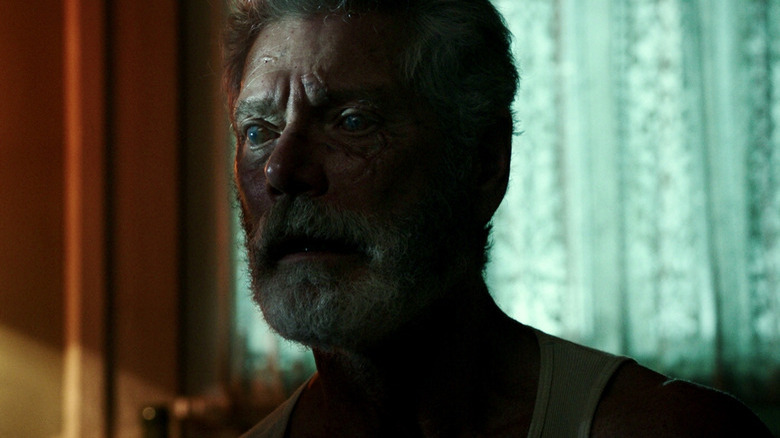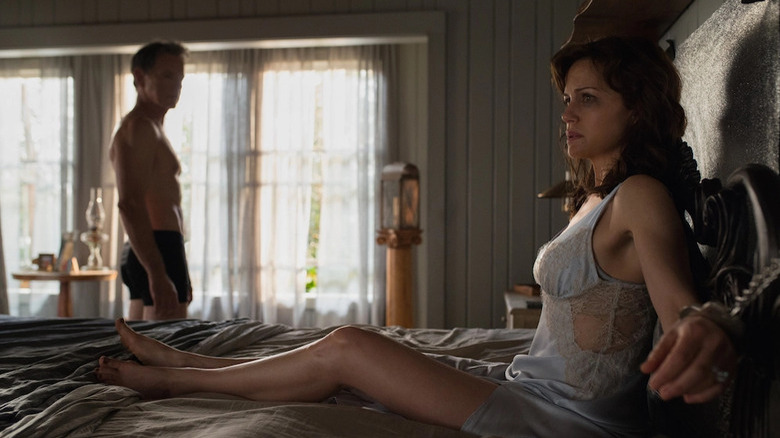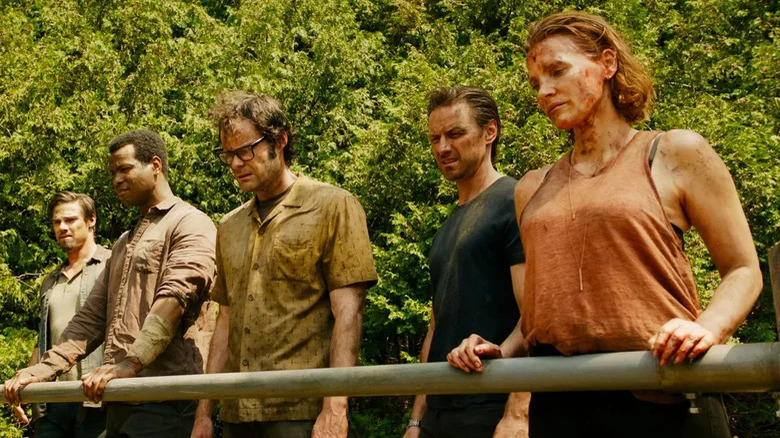The Most Controversial Horror Movie Endings Of All Time
Out of all the different types of films, the horror genre takes some of the biggest swings when it comes to endings. From bleak conclusions to those that tie everything up in a neat bow, horror movie endings have shocked, confused, and annoyed audiences over the years. One's opinion on horror's most (in)famous endings depends a lot on personal preference. Do you prefer an ending that offers hope or one that drives home a message of wretchedness? Are you a fan of the Shyamalan twist, or do you go for a more subtle approach?
A lot of thought goes into the ending of any film, and horror movies in particular. Sometimes, the director or writer's original vision isn't what ends up on screen. How test audiences react to a film can alter its ending considerably, and sometimes studios just can't get behind the film's creative vision. In other instances, a filmmaker might fight for their chosen ending, only to have it criticized by viewers.
In either case, horror audiences have a lot to say about the endings of their favorite – or least favorite – films. Here are the horror movie endings that have provoked the most debate amongst fans, arousing both exasperated sighs and shrieks of fear. Be warned – major spoilers ahead.
Psycho
Widely considered one of the greatest horror films of all time, Alfred Hitchcock's "Psycho" marks an early entry in the slasher genre. The film is a stylish masterpiece, replete with masterful acting, a chilling score, and the most famous shower scene in cinema history. It's almost perfect, apart from an oddly didactic conclusion that puts a damper on the creepy factor.
We all know the climax of "Psycho." Norman Bates' (Anthony Perkins) mother has been dead all along, and it's Norman himself who has been committing the murders. Norman has a fractured psyche, which means he switches between his own personality and that of his mother. The famous final shot of the film depicts Norman (aka Mother) looking at the camera with a devilish grin.
Unfortunately, the preceding 10 minutes undermine this chilling final frame, as a psychiatrist explains to the still-living characters how the melding of Norman/Mother came to pass. While "Psycho" remains a beloved film, the ending doesn't sit right with moviegoers looking for something a little more subtle. Anthony Perkins' performance is incredible, and viewers surely could have inferred the meaning of that last sequence without all that instruction.
The Shining
It's not controversial to call Stanley Kubrick's "The Shining" the best Stephen King adaptation ever made. Kubrick's trippy visuals, Jack Nicholson and Shelley Duvall's shocking performances... there's so much to love. Many viewers like the ending, which concludes the story on a mysterious note. Danny (Danny Lloyd) and Wendy (Duvall) escape the Overlook Hotel on a snowcat, though their ultimate fate remains unknown. Jack (Nicholson) kills the Overlook's chef, Mr. Hallorann (Scatman Crothers), before freezing to death outside. In the final shot, we see Jack in a photo of the Overlook from 1921, indicating that he is now forever a part of the hotel's history.
The most outspoken critic of the film? Stephen King himself. He famously hates the characterization of both Jack and Wendy, and Kubrick's alternate ending exemplifies the differences between the two versions. In King's book, the Overlook blows up and Wendy, Danny, and Hallorann flee to Florida. In the film, the hotel and Jack freeze, while Wendy and Danny drive off through the storm. King maintains that the film has "no heart," as indicated by this distinction between warmth and coldness.
Others contend that killing Hallorann was a troubling choice that ties into the trope of Black characters always being killed in horror movies. However, we do get to see Hallorann again in "Doctor Sleep," which serves as a King-approved adaptation of the book. If you're a fan of "The Shining," you might find yourself disagreeing with the author about this one.
Signs
Although he brings plenty of other creative elements to the table, M. Night Shyamalan remains best known for his twist endings. Even if you've never seen it, you probably know the famous line from "The Sixth Sense" that marks the film's shocking reveal. Because of his penchant for third-act surprises, Shyamalan's films often spark heated debates. Take, for example, his 2002 film "Signs," which is either an underrated parable about faith and the end of the world, or an alien movie without much bite; it all depends on your perspective.
The film follows Graham (Mel Gibson), a former minister living on a farm in Pennsylvania with his son Morgan (Rory Culkin), daughter Bo (Abigail Breslin), and brother Merrill (Joaquin Phoenix). Still grieving the loss of his wife in a car accident, Graham and his family face an inexplicable alien invasion. When Graham recalls his wife's final words – "Swing away" – Merrill defeats the aliens with a glass of water (they're allergic to it) and a baseball bat. Graham's faith is restored and the family survives.
Some viewers find it laughable that the aliens' Kryptonite is water when the Earth is 70% ocean, while others don't buy into the mystical implications of the wife's final words or the suggestion of divine intervention. On the other hand, the true meaning of these signs is up for interpretation. What do you believe?
The Descent
One of the best horror films of the 2000s, "The Descent" delivers plenty of thrills, even if it hasn't achieved the same staying power as "The Ring" or "The Grudge." Directed by British filmmaker Neil Marshall, the story follows several women who go spelunking in the caves of North Carolina. One of the women, Sarah (Shauna Macdonald), lost her husband and daughter in a car crash the year prior.
As if the claustrophobic ambiance of the caves weren't enough, the women also encounter mole-like humanoids who feed on human flesh. Everyone but Sarah dies in the caves — depending on which ending you see. In the original UK version, Sarah escapes the cave and makes it to the road where she hallucinates her traitorous friend Juno (Natalie Mendoza). The next scene reveals that Sarah never left the cave at all and is still down there hallucinating her dead daughter as the creatures surround her. Lionsgate, the film's American distributor, considered that ending too depressing, so the U.S. cut depicts Sarah escaping without that final twist.
Some fans find the final jumpscare of Juno unnecessary, though it certainly delivers one last fright. In fact, both endings are extremely bleak, which is bound to upset certain viewers. Marshall told Vulture he doesn't think the U.S. version is "a happy ending at all" because Sarah loses her sanity. In his mind, the UK version is the happier ending, "Not for us, but for her."
The Mist
The ending of "The Mist," Frank Darabont's third Stephen King adaptation, will either make you love or hate the film. Set in small-town Maine, the film centers on David Drayton (Thomas Jane) and his son Billy (Nathan Gamble). David and Billy get trapped in a grocery store when a mysterious mist filled with violent monsters descends on the town. David and a few of his new friends escape the grocery store by car and drive until they run out of gas. With the mist surrounding them and the monsters approaching, they decide to take their own lives. David shoots everyone in the car — including his son — but there are no bullets left for him. In an awful twist, just as David surveys what he's done, the mist clears and rescue arrives.
The movie's ending marks a huge departure from the book, which describes David and the gang trapped in the mist, their future uncertain. Darabont took a big swing, and King maintains it was the right choice. He called the ending "terrific" because it was "so anti-Hollywood — anti-everything, really! It was nihilistic. I liked that."
When "The Mist" premiered in 2007, audiences were not too keen on the grim finale. But the critical consensus of the film has improved over the years, with viewers coming to appreciate its no-holds-barred approach.
I Am Legend
Changing a book's ending for a film adaptation always courts controversy, something Stephen King knows all too well. Will Smith's blockbuster "I Am Legend" is another example of this choice, one that audiences didn't receive all that well. Based on Richard Matheson's novel of the same name, the film hones in on Dr. Robert Neville (Smith), an Army virologist who lives in a zombie-infested New York with his beloved German Shepherd. The film ends with Dr. Neville creating a cure for the virus, passing it along to two other survivors, Anna (Alice Braga) and Ethan (Charlie Tahan), and sacrificing himself so they can escape.
What viewers saw in theaters was not the original ending, however. The intended conclusion shows Neville having an epiphany about his actions as he realizes he's the monster in the eyes of these zombies. He stops experimenting on the Darkseekers and leaves the cure behind as he flees with Anna and Ethan. That tested poorly with audiences, giving us the ending audiences know today.
The final ending eradicates much of the nuance in Matheson's book, which describes Darkseekers more like vampires than zombies – essentially, as more human. The film gives Neville a hero's journey instead of leaning into the moral ambiguity of the situation. Many fans take issue with this change, especially since the book's ending is so haunting. In fact, the upcoming "I Am Legend 2" will ignore the final ending of the first film and instead follow the alternate ending.
Martyrs
As the name suggests, New French Extremity is not for everyone. Coined by critic James Quandt in 2004, the term refers to a crop of French films released around the turn of the century that depicted violence in a visceral, extreme manner. Pascal Laugier's "Martyrs," one of the most famous — or infamous — of these movies, remains a controversial example. In it, two young women, Lucie (Mylène Jampanoï) and Anna (Morjana Alaoui), are captured by a cult looking to prove the existence of the afterlife.
The cult uses torture — calling their victims "martyrs" — to unlock the secrets of the afterlife. Anna survives longer than any of their other subjects and reaches the study's final stage, being flayed alive. She survives the torture and whispers something to Mademoiselle (Catherine Bégin), the cult's leader. Mademoiselle tells the other cult members to "keep doubting" before killing herself with a gun.
Viewers aren't privy to what Anna told Mademoiselle, which leaves the ending's meaning open for interpretation. Did Mademoiselle kill herself because Anna proved the existence of the afterlife, or because she didn't? Either way, it's one of the most disturbing climaxes in horror history, dividing viewers. "I just finished watching Martyrs, and I regret watching it," Redditor u/_endorstoi wrote. On the other hand, u/Xinsects argued that "The ending of Martyrs (2008) offers one of the most brilliantly ambiguous endings I know of." It's hard to feel indifferent towards a movie that's so, well, extreme.
Eden Lake
The 2008 film "Eden Lake" begat controversy not just because of its violence, but because of its troubling take on class politics. A middle-class couple, Steve (Michael Fassbender) and Jenny (Kelly Reilly), go camping in a working-class area. A gang of violent, working-class teenagers attacks the couple, killing Steve as Jenny narrowly slips away. Only Jenny doesn't really escape, because she enters a house occupied by the parents of these teenagers, and they don't seem too keen on letting her go. Cue the screams.
It's a bleak ending, and for the most part, it reinforces the vilification of the working class, as the entire community appears morally depraved. "The ending damn near ripped my heart out and left me feeling so pissed off, such a grave injustice," wrote Redditor u/lennoxlovexxx. Another viewer expressed frustration that the teens weren't punished for their actions. Taking politics into consideration, some critics have noted that the film exemplifies the style of "hoodie horror" that demonizes the working class. A hopeless ending and praise from the Daily Mail isn't exactly a recipe for success.
The Devil Inside
No one likes clickbait, which is exactly why the ending of "The Devil Inside" pissed so many people off. The found-footage, mockumentary-style film follows Isabella Rossi (Fernanda Andrade), a young woman trying to expose the truth about demonic possession. She travels to Italy with documentarian Michael Schaefer (Ionut Grama), Father Ben Rawlings (Simon Quarterman), and Father David Keane (Evan Helmuth) to find answers about her mother, Maria Rossi (Suzan Crowley), who murdered three people during an exorcism years prior.
Maria's possession spreads, first to Father Keane, then to Isabella, and then to Michael. Father Keane kills himself and Michael drives his car off the road, leaving a still-possessed Isabella in the wind. And then what happens? A black screen with the words "For more information about the ongoing investigation visit www.TheRossiFiles.com."
Marketing gimmicks for horror films have achieved success in the past, most notably the mania-inducing campaign surrounding "The Blair Witch Project." In 2008, "Cloverfield" became a viral sensation due to its brilliant marketing campaign. But "The Devil Inside" came out in 2012, and this kind of thing was no longer a novelty. The stunt didn't land for fans, who mainly thought it a laughable failure. No one wants to go to a website to find out how a film ends.
Mama
It's always controversial when kids die in horror movies, the ending of "Mama" included. Andy Muschietti's film — produced by Guillermo Del Toro — follows a couple, Annabel (Jessica Chastain) and Luke (Nikolaj Coster-Waldau), who begin caring for Luke's nieces. Luke and Annabel find Victoria (Megan Charpentier) and Lily (Isabelle Nelisse) in an abandoned cabin in the woods, where they've been living for five years. They've survived so long thanks to the aid of a mysterious figure known as Mama (Javier Botet). Haunted by the loss of her baby many years ago, Mama wants to recreate her suicidal trip off a cliff with the girls.
Annabel and Luke try to fight off Mama and claim Victoria and Lily as their own, but Lily still sees Mama as her mother. Rather than staying with Annabel and Luke, Lily chooses to go with Mama, who leads her off the cliff. As they collide with a branch below, Lily and Mama explode into a horde of moths, one of which lands on Victoria's hand.
Though Del Toro called the conclusion a "happy ending," Lily's suicidal choice upset many viewers, and the inexplicable moth transformation is difficult to swallow. "It's great until the end," wrote Redditor u/EvilGraphics. The film is also let down by the goofy-looking CGI in the final act, which was originally meant to use practical effects. u/Elissa-Megan-Powers described the climax as "half an hour of absolutely needless exposition and overt, masturbatory CGI."
10 Cloverfield Lane
The ending of "10 Cloverfield Lane" bothered many viewers because of its sharp right turn. The second movie in the loosely related "Cloverfield" franchise, which plays more like a psychological thriller and a character study than a sci-fi film, stars Mary Elizabeth Winstead as Michelle, a young woman who gets in a car crash. Knocked unconscious, she wakes up chained to a wall. A man named Howard (John Goodman) tells her that there's been an attack — it could be aliens or the Russians — and she must stay in his bunker for a couple of years while the poisoned air clears up.
Michelle's only ally is Emmett (John Gallagher Jr.), Howard's assistant of sorts. Though Michelle comes to believe the air truly is poisoned when a woman with melting skin knocks on their door, she also knows Howard is dangerous and she has to escape. She breaks out of the bunker in a hazmat suit and realizes the air is not toxic – but the aliens are real. "Oh, come on," she exclaims.
This bait and switch didn't sit well with certain viewers, who thought the ending betrayed the film's previously established themes. One blogger claimed the ending "sucks," while a Reddit user argued the ending "nearly ruined the movie." On the other hand, some critics defended the ending, noting that the film was a sci-fi picture all along.
Don't Breathe
Though a single human man serves as the villain of Fede Álvarez's 2016 film "Don't Breathe," the home that our protagonists enter feels more horrific than any basic haunted house. Young thieves Rocky (Jane Levy), Alex (Dylan Minnette), and Money (Daniel Zovatto) make a living breaking into people's houses. The trio learns that a blind man named Norman (Stephen Lang) keeps a sizable chunk of cash hidden in his house, so they decide to break in and steal it. Norman is a more formidable foe than they imagined, however, and he kills Money.
Though it begins as a classic slasher film, "Don't Breathe" delivers a brutal twist. Rocky and Alex find a pregnant woman named Cindy (Franciska Törőcsik) locked up in Norman's basement. After Norman accidentally kills her, he takes Rocky instead, revealing that Cindy was pregnant with his child — a replacement for his lost daughter. He nearly inseminates Rocky with a turkey baster before Alex stops him.
The final sequence reveals that Norman survived after Rocky shot him, but it's the insemination twist that really divides audiences. To some, the pregnancy plot felt totally unnecessary. The movie contains enough violence as it is, so do we really need misogynist brutality on top of all that? The staff of Wired called the twist "awful," though opinions on the film and its ending online vary. Either way, the popularity of the first film was enough to produce a sequel, with less-than-successful results.
Gerald's Game
Adaptations of Stephen King novels often generate heated debates among fans. Take, for example, "Gerald's Game," which divided fans about the ending. Mike Flanagan's take on the book catches up with Jessie (Carla Gugino) and her husband Gerald (Bruce Greenwood) as they go on a romantic getaway. When Gerald dies of a heart attack during an intimate moment, Jessie remains handcuffed to the bed. Jessie's mental and physical state deteriorates and she begins hallucinating her dead husband and having flashbacks of her traumatic childhood. A figure known as the Moonlight Man (Carel Struycken) visits Jessie in the night, though she's not sure if he's real.
Jessie eventually escapes, and in the film's epilogue, we learn of her fate. She reckons with the horrible trauma she experienced as a child and starts a foundation for victims of abuse. She then goes to the trial of the very real Moonlight Man and proves that he no longer has power over her.
Many King fans take issue with the extended epilogue (it's 50 pages long) in the book, and the film's ending proved similarly contentious. Some viewers find it corny and think it ruins the momentum. "It completely gets rid of any ambiguity that made it creepy," writes Redditor u/deimosremus. Flanagan was well aware of the critical divide over the epilogue but felt strongly about including it. "I fully expect that [the epilogue is] going to be the lightning rod," Flanagan told Bloody Disgusting in 2017.
It Chapter Two
It's become a running gag among Stephen King fans that his books rarely provide satisfying endings. While some film adaptations improve on the original endings, others fail to do so. Andy Muschietti's "It Chapter Two" tackles the second half of King's book, but doesn't exactly stick the landing. The sequel takes place 27 years after the first film and follows the adult members of the Loser's Club as they come together one last time to defeat Pennywise.
In the novel, Pennywise turns into a giant spider and Bill kills him by crushing his heart in his hands. This makes little sense and is far too literal but Muschietti's ending works no better. In the film, Pennywise is still a clown, and when the friends descend into the sewers one last time, they defeat him by... bullying him to death. That's right, they tease Pennywise until he shrivels up and dies right there.
Not only is this ending anticlimactic, but it also goes back on the film's message, which is that bullying is, you know, bad. Our very own Witney Seibold wrote "It Chapter Two Made Stephen King's Bad Ending Even Worse," and other critics agreed. You'd be hard-pressed to find any staunch defenders of the ending, though there are probably a few out there. Maybe it's all meta irony, a commentary on King's famously unsatisfying endings, but we're not convinced.
